Who Played the Sirens in Brother Where Art Thou
Odysseus
Odysseus, "the man of twists and turns," was a Greek king famous above all for his cunning. After helping the Greeks conquer Troy, Odysseus wandered the world for x years trying to get dorsum dwelling to his beloved married woman and son.
Past Avi Kapach Terminal updated on April. 12th, 2022
-
No. Demigods were usually defined as the children of one mortal parent and one immortal parent, while Odysseus' parents, Laertes and Anticlea, were both mortal.
-
Yes. Odysseus fought on the Greek side during the Trojan War. In fact, information technology was Odysseus who came up with the Trojan Horse, the clever device that finally allowed the Greeks to breach Troy's walls and conquer the city.
-
Aye. Though it took him ten years of wandering, Odysseus did eventually make it back to Ithaca. When he finally arrived, nonetheless, he constitute his palace crawling with violent suitors who wanted to marry his wife Penelope and take over his kingdom. Odysseus' homecoming was thus non complete until he was able to kill all the suitors.
-
No—though he did wound him. During his wanderings, Odysseus happened upon the island of the Cyclopes. After the Cyclops Polyphemus ate several of Odysseus' men, Odysseus managed to escape by blinding Polyphemus.
-
Yes. While Penelope remained true-blue to Odysseus for the entirety of his twenty-year absenteeism (in most versions, at least), Odysseus took several lovers during his long wanderings. These included the goddesses Circe and Calypso. In a strange twist of fate, one of his sons past Circe, Telegonus, went on to accidentally kill Odysseus.
Odysseus, the son of Laertes and Anticlea, was rex of the island of Ithaca. Known by Homer as "the man of twists and turns" and favored by the goddess Athena, Odysseus was remarkably intelligent and cunning. He used these qualities to great consequence during the Trojan State of war: 10 years into the war, Odysseus devised the play a trick on of the Trojan Horse to assist the Greeks penetrate Troy'southward impregnable walls and conquer the city.
Subsequently sacking Troy, Odysseus spent ten years wandering the world equally he tried to get back abode to Ithaca. These wanderings are the most famous part of his mythology and are full of fantastic adventures: Odysseus faced Cyclopes, sorceresses, and bounding main monsters, amidst other creatures. Eventually, he made information technology back to Ithaca, killed all of the suitors who were trying to ally his wife and take over his kingdom, and was reunited with his family.
#Etymology
The etymology of the proper noun "Odysseus" has been much debated. In ancient Greek literature, it was connected with the words odyssomai ("to exist angry with, to hate"), odyromai ("to lament"), or ollymi ("to perish, to exist lost"). In Book 19 of the Odyssey, for example, the retainer Euryclea tells of how, when Odysseus was born, his granddad Autolycus named him Odysseus "inasmuch equally I am come hither as ane that has been angered with [Greek: odyssamenos] many, both men and women, over the fruitful earth."1
However, modern scholars generally regard the derivation of "Odysseus" from odyssomai every bit a folk etymology. Attempts have been made to trace the proper noun to diverse locales and languages from Odysseus' mythology, including Illyria or Epirus in northwestern Hellenic republic, continental Europe, Asia Pocket-size, and Babylonian or Hittite. Other scholars take but concluded that the name is pre-Greek.2
#Pronunciation
-
English
Greek
Odysseus
Ὀδυσσεύς
-
Phonetic
IPA
[oh-DIS-ee-uhs, oh-DIS-yoos]
/oʊˈdɪs i əs, oʊˈdɪs yus/
#Alternate Names
From an early on date, Odysseus' proper noun existed in a number of variants, including Oliseus, Olyseus, Olysseus, Olyteus, Olytteus, Ōlysseus, and Oulixēs. These forms seem to have been more closely related to Odysseus' Italian counterparts, the Etruscan Uthuze and the Roman Ulixes or Ulysses. According to John Tzetzes, the Etruscans sometimes chosen Odysseus Nanus or Nannus.iii
#Titles and Epithets
Odysseus' most famous epithet is polytropos, popularly translated as "the human of twists and turns." This is one of several epithets that highlight Odysseus' cunning. Others include polymētis, "of many councils," and polymēchanos, "of many devices."
Odysseus had other important epithets. Because of his function in sacking Troy, he was chosen ptoliporthios ("sacker of cities"). Due to his many long years of wandering, he was called polytlas and polytlēmōn ("much-suffering, much enduring"), polypenthēs ("of much hurting"), and polystonos ("of much sorrow"). Finally, Odysseus was often simply called by his patronymic, Laertiadēs, significant "son of Laertes."
#Attributes
Odysseus was the king of Ithaca, a small-scale, rocky isle on the west coast of Greece. Dissimilar the kingdoms of well-nigh other great heroes, Odysseus' isle home was humble and insignificant.
What Odysseus lacked in political prestige he made up for in his intellectual attributes. Every bit his famous epithets suggest, Odysseus, "the human of twists and turns," was extraordinarily cunning. Information technology was no dubiousness partly because of this cunning that Athena, the goddess of wisdom (amongst other things), loved Odysseus so dearly.
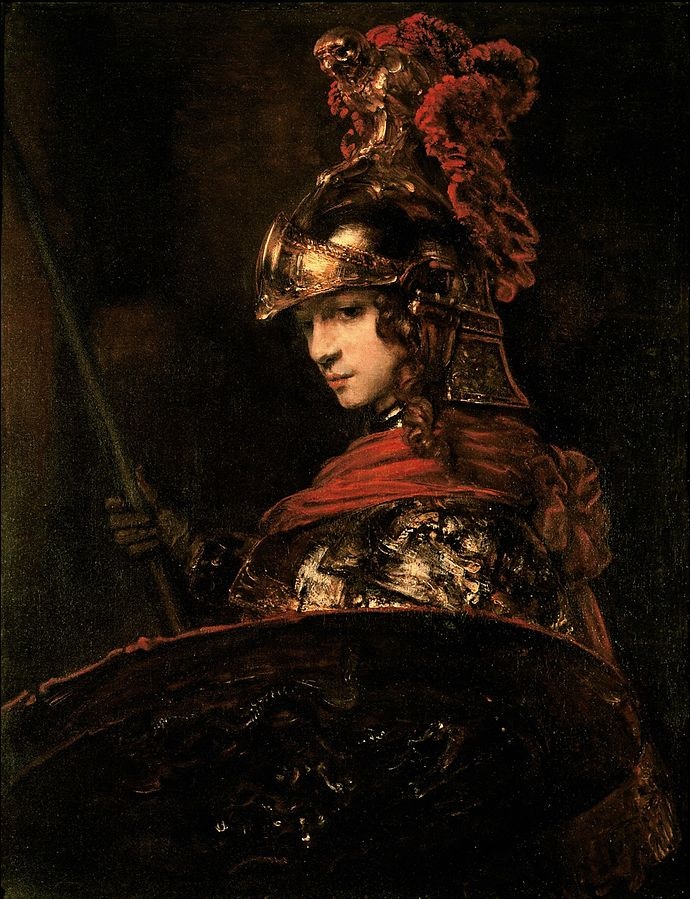
Pallas Athena, attributed to Rembrandt van Rijn (ca. 1655).
Physically, Odysseus was typically described as not very tall but broad-shouldered and broad-chested.4 He was known for his speed too as his strength, as illustrated in many of the myths about him.
In artistic representations from the fifth century BCE and across, Odysseus is typically recognized by a pilos, a conical hat or skullcap oft associated with sailors in ancient Greece.
#Family
In the standard account, first attested in the Homeric epics, Odysseus was the son of Laertes and Anticlea. Laertes was the king of Ithaca; in some traditions, he was one of the Argonauts who had sailed with Jason in his quest for the Golden Fleece.5 Anticlea was the daughter of Autolycus, a talented thief and a son of Hermes.6 As Anticlea's son, Odysseus was thus the grandson of Hermes.
According to some traditions, however, Odysseus' father was not Laertes simply Sisyphus. As the story went, Sisyphus had seduced Anticlea before she married Laertes and was thus Odysseus' true father.7
Odysseus had a sister named Ctimine. She married Eurylochus of Aforementioned, who fought with Odysseus in the Trojan State of war but died, forth with the remainder of Odysseus' men, on the journey abode.8
Odysseus' wife, Penelope, was a Spartan princess. Together they had a son named Telemachus, born before Odysseus went off to fight in the Trojan War.9 In some traditions, Odysseus and Penelope had other sons after he returned from the war, including Acusilaus10 and Poliporthes or Ptoliporthes.11
Odysseus took many lovers during his travels, often fathering children by them. With the sorceress Circe, for instance, Odysseus fathered Telegonus, who was later on responsible for Odysseus' death.12 About sources concur that Odysseus and Circe had other children, too, though they disagree on the verbal number also as their names.13
With Calypso, a daughter of the Titan Atlas, Odysseus fathered Nausithous and Nausinous.14 In some sources, Calypso was also the mother of children commonly assigned to Odysseus and Circe, including Ausonfifteen and Telegonus (or Teledonus).16
With Callidice, the queen of Thesprotia in northwestern Greece, Odysseus fathered Polypoetes.17 This child went on to rule Thesprotia later on his female parent died and Odysseus returned to Ithaca.
With Euippe, a northern Greek princess, Odysseus fathered Euryalus. Unfortunately, the boy suffered a tragic fate: when Euryalus came to Ithaca in search of his father, Odysseus did non recognize him and killed him.18
Finally, with an unnamed daughter of the Aetolian Thoas, Odysseus had a son named Leontophonus.nineteen
#Family Tree
-
Parents
father
mother
- Laertes/Sisyphus
- Anticlea
-
Siblings
sis
- Ctimine
-
Consorts
wives
lovers
- Penelope
- Callidice
- Circe
- Calypso
- Euippe
- unnamed daughter of Thoas
-
Children
sons
- Telemachus
- Telegonus
- Agrius
- Latinus
- Nausithous
- Nausinous
- Polypoetes
#Mythology
#Early Life
Though Odysseus became most famous for his role in the Trojan State of war and his subsequent wanderings, at that place is at least one important myth about his early life.
When Odysseus was just entering adulthood, he went to visit his maternal grandfather, Autolycus, on Mount Parnassus in northern Greece. I day, while hunting with his granddaddy and uncles, his thigh was gored by a boar. Odysseus managed to kill the boar and escape, simply the encounter gave him a scar on his thigh that he carried for the balance of his life (and which allowed some people to recognize him when he returned to Ithaca after his xx-year absence).twenty
#The Oath of Tyndareus and Spousal relationship to Penelope
Some fourth dimension later on, Odysseus was amidst the suitors who came to Sparta to seek Helen'due south hand in matrimony. Helen's beauty was so famous that all the most powerful Greek princes and heroes wanted to marry her. Odysseus was well aware that he, with his humble kingdom, did non stand a adventure against his wealthier and more than powerful rivals. In one version, he did not even bother to bring any gifts to accompany his suit, and so sure was he that he could never win Helen.21
Just Odysseus knew that Helen's father, Tyndareus, was afraid that equally soon equally he chose one of the suitors for his daughter, the others would quarrel with the winner. Odysseus had a solution to this problem, which he offered to share with Tyndareus—in exchange for his help in winning the hand of Helen's cousin Penelope.
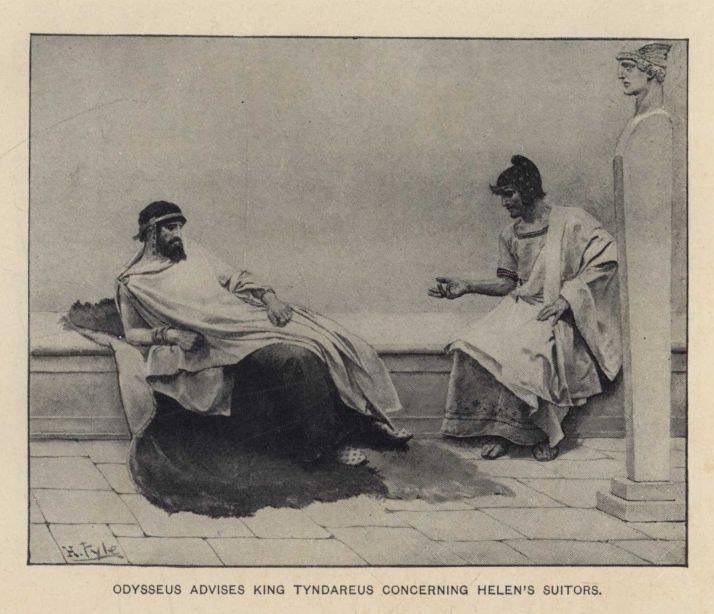
Odysseus Advises King Tyndareus Concerning Helen's Suitors by Howard Pyle (1905).
Once Tyndareus agreed to the terms, Odysseus explained his solution to the suitor problem: Tyndareus should simply make all the suitors swear an oath that they would back up Helen's chosen married man against anybody who might attack him. Afterwards the suitors swore this oath—often called the "Oath of Tyndareus"—Helen was safely married to Menelaus.22
Tyndareus kept his discussion and helped Odysseus win Penelope. In some versions, Tyndareus simply made Icarius, Penelope'due south father, ally his daughter to Odysseus.23 Just in other versions, Odysseus only won Penelope subsequently he defeated her other suitors in a footrace.24
#The Trojan State of war
Odysseus as Recruit and Recruiter
In near accounts, Odysseus and Penelope were happy together. Before long they had a son, whom they named Telemachus.
But their happiness was cutting brusque when, back in Sparta, Helen ran off with the dashing Trojan prince Paris. Menelaus flew into a rage and resolved to cease at nothing to become her back. He therefore chosen on all of Helen's erstwhile suitors to join him in attacking Troy: afterwards all, past swearing the Oath of Tyndareus, the suitors had committed to support Helen'southward spousal relationship against any who violated it. They had no choice but to help Menelaus.
Since he had been i of Helen's suitors, Odysseus was too required to join in the war effort. In one pop myth, he tried to avoid going to Troy by feigning madness; when the Greeks came to get him, he yoked a equus caballus and a bull to a plough and started sowing his fields with common salt.
But one of the recruiters, Palamedes, did non buy Odysseus' convenient bout of insanity. He proved that Odysseus was faking by placing the babe Telemachus in front of the plow; Odysseus swerved out of the way at the last moment. With his sanity confirmed, Odysseus was forced to join the Greeks in the Trojan War—but he continued to deport a fateful grudge against Palamedes.25
Perhaps somewhat hypocritically, Odysseus then went on to help Menelaus recruit other draft dodgers. The well-nigh important of these was Achilles: there had been a prophecy that without him, the Greeks would non be able to take Troy. Only Achilles' female parent, Thetis, did not desire the boyfriend to fight in the Trojan State of war, for another prophecy had predicted that he would die there. Thus, she disguised Achilles as a daughter and hid him among the daughters of Lycomedes, the rex of the island of Skyros.26
Undeterred, Odysseus came up with a clever plan to draw Achilles out of hiding. He came to Skyros with gifts for Lycomedes and his daughters—mostly wear and jewelry, but besides a shield and spear. Next, Odysseus had his men outside imitation an attack on the palace. While the girls panicked, Achilles threw off his disguise, grabbed the shield and spear, and prepared to fight. Once Achilles had revealed his identity in this way, Odysseus convinced him to join the Greeks in their war against Troy.27
Delegation to the Trojans
Subsequently several misadventures (which lasted as many as ten years, co-ordinate to some sources), the Greeks finally reached Troy. Hoping that the Trojans would desire to avoid a fight, the Greeks decided to send a delegation to demand that Helen exist returned. The group was headed past Helen's husband, Menelaus, and the crafty Odysseus.
This attempt at diplomacy did not get well. The Trojans refused to return Helen, and 1 of the Trojan elders even tried to have Menelaus and Odysseus assassinated. After making their escape, Menelaus and Odysseus reported the disappointing results to the rest of the Greeks. Thus began the Trojan War.28
Led by Menelaus' older blood brother Agamemnon, the Greeks attacked Troy with everything they had. Just Troy's walls were well-nigh impregnable, and the Greeks before long realized that they needed to settle in for a long state of war.
Revenge on Palamedes
Meanwhile, Odysseus had non forgotten how Palamedes had put his son's life in danger when he came to Ithaca to recruit him. Thus, early in the Trojan War, Odysseus decided to take his revenge.
At that place are unlike accounts of this episode. In i version, Odysseus framed Palamedes for treason. He hid Trojan gold in Palamedes' tent and forged letters between Palamedes and the Trojan male monarch Priam, in which Palamedes promised to beguile the Greeks. This was evidence plenty for the Greeks, who promptly put Palamedes to death.29
In another version, attested in a much later source, Odysseus and his friend Diomedes convinced Palamedes that there was treasure buried at the bottom of a well. When Palamedes descended the well to look, Odysseus and Diomedes hurled large stones on top of him and buried him live.30
Odysseus in the Iliad
Odysseus was one of Agamemnon'southward most trusted advisors during the Trojan War and is thus an important grapheme in Homer'southward Iliad, which takes identify during a few eventful weeks in the ninth twelvemonth of the war.
Throughout the Iliad, Odysseus distinguishes himself repeatedly as a keen diplomat and firm leader. I episode tells of how Agamemnon tried to test the mettle of the Greek regular army past telling them that they could become abode, hoping that they would voluntarily cull to stay at Troy until they had sacked the urban center. Instead, the army took Agamemnon at his word and stampeded for the ships. It was Odysseus who prevented them from disbanding.31
This was not the just time Odysseus cleaned up (or tried to clean upwards) one of Agamemnon's messes. After Agamemnon insulted Achilles, the greatest of the Greek warriors, and acquired him to abandon the war, Odysseus went to Achilles to try and smooth things over. This time, however, Odysseus' diplomacy failed, for Achilles refused to forgive Agamemnon.32
Later, with the Trojans gaining ground in Achilles' absenteeism, Odysseus and Diomedes went out on a nighttime spying mission to gather intelligence. They were able to capture a Trojan spy called Dolon, who told them where they could find fresh Trojan reinforcements, led by the Thracian king Rhesus. After killing Dolon, Odysseus and Diomedes snuck into Rhesus' camp, killed him and his men, and stole his prize horses.33
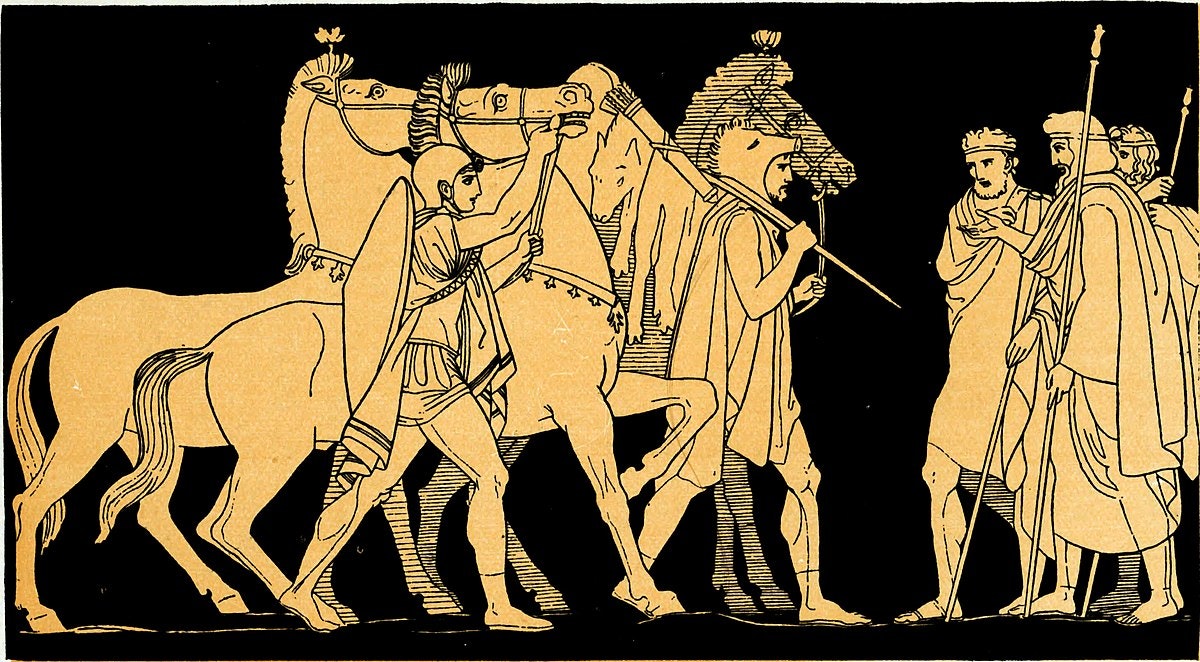
Diomed and Ulysses Returning with the Spoils of Rhesus by John Flaxman (1895).
Homer's Odysseus is also a brave and skilled fighter, even if he is not as impressive as other heroes like Achilles or Ajax. In one boxing, it was only through Odysseus' efforts that the Greeks were not completely routed by the Trojans.34 During the funeral games for Patroclus, Odysseus proved his power by wrestling Ajax to a draw and winning the footrace.35
Later Achilles' close friend Patroclus was killed in battle by the Trojan champion Hector, it was Odysseus who managed to temper Achilles' rage. Achilles, devastated by the loss of his friend, wanted to set on the Trojans immediately. But the more level-headed Odysseus convinced him to let the Greeks eat something first.36
The Armor of Achilles
After Achilles was killed by the Trojan prince Paris, Odysseus and Ajax helped conduct his body back to the Greek military camp. Achilles received a lavish hero's burial, afterwards which it was decided that his precious armor, forged by the smith god Hephaestus himself, should go to the greatest surviving Greek hero.
Ii men presented themselves equally candidates for this title: the giant Ajax (sometimes called Ajax "the Greater," to distinguish him from some other Ajax of smaller stature who also fought at Troy, called Ajax "the Lesser") and Odysseus. Though Ajax was the better warrior, Odysseus' cunning and strategic ability was considered even more valuable. Odysseus was therefore awarded the armor.
Ajax, furious and humiliated, wanted to avenge his honor past murdering Odysseus. But Athena, Odysseus' protector, acquired Ajax to become mad and turn his sword against the livestock instead. When Ajax realized what he had done, he killed himself.37
Neoptolemus and Philoctetes
With the deaths of both Achilles and Ajax, the Greeks were down their 2 all-time warriors. According to a prophecy, if they had whatever hope of winning the Trojan War (which had already been raging for a decade), they needed the help of Achilles' son Neoptolemus (also called Pyrrhus), who was existence raised on the island of Skyros. Odysseus, who had once recruited Achilles on that very island, at present returned there to bring Achilles' son to Troy.38
Another prophecy revealed that the Greeks could non conquer Troy without the bow of Heracles (and, mayhap more than importantly, the poisoned arrows that accompanied it). This peachy bow belonged to Philoctetes, who had joined the Greek army when the war broke out merely who had been marooned on the isle of Lemnos later receiving a foul-smelling injury.
Once over again, it was Odysseus who went to fetch the warrior. Though Philoctetes at first refused to go with Odysseus (it had been Odysseus' idea to maroon Philoctetes in the first place), he was somewhen convinced. In one case at Troy, his injury was cured and he used his famous bow to kill Paris.39
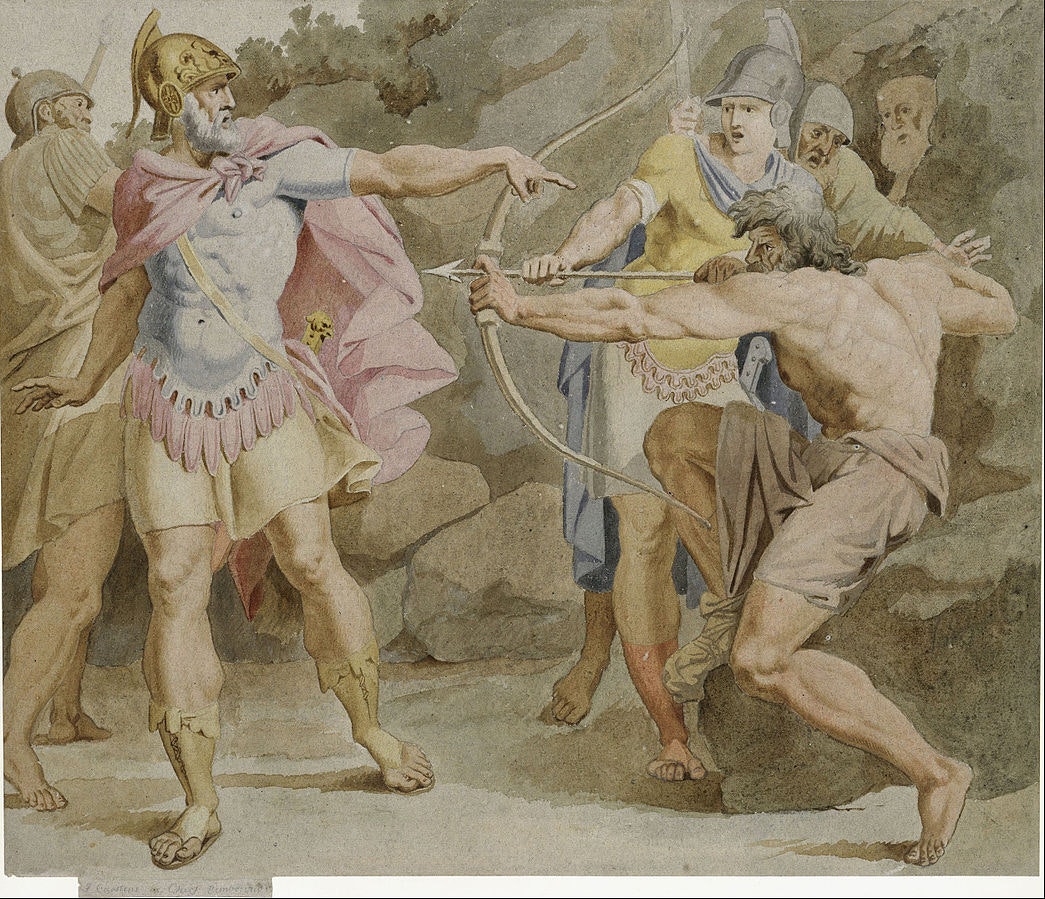
Philoctetes Aiming the Bow of Hercules at Odysseus by Asmus Jakob Carstens (1790). Kupferstichkabinett Museum, Berlin, Germany.
The Palladium
The Greeks soon learned of yet another prophecy concerning the course of the war: the city of Troy could not exist conquered, it was said, every bit long as the Trojans held the Palladium—an ancient statue sacred to Athena—inside their walls.
Odysseus once again came to the rescue, vowing to steal the Palladium. In some versions of the myth, he snuck into Troy by himself, bearded every bit a beggar, but in most versions he was assisted in some chapters by his usual accomplice, Diomedes.40
The Trojan Horse
Later on the Greeks had been at Troy for x years, Odysseus fabricated what was no doubt his most important contribution to the war attempt: he found a mode to win the war.
His programme was relatively simple: the Greeks would build a hollow wooden horse in which several of their heroes would hide. They would and then lath their ships and canvass away from Troy, leaving the horse on the beach. Later the Trojans had taken it into the city, the men would sneak out of the horse and open the gates for the Greek army.
To ensure that the Trojans took the bait, the Greeks told i man, Sinon, to stay behind. Sinon pretended that he had been bandage out by the Greeks and that the equus caballus was an offer to Athena: the Trojans would exercise well, he said, to take information technology into their urban center. Though some doubted Sinon (particularly Cassandra and the priest Laocoon), the Trojans ended up bringing the horse into Troy.
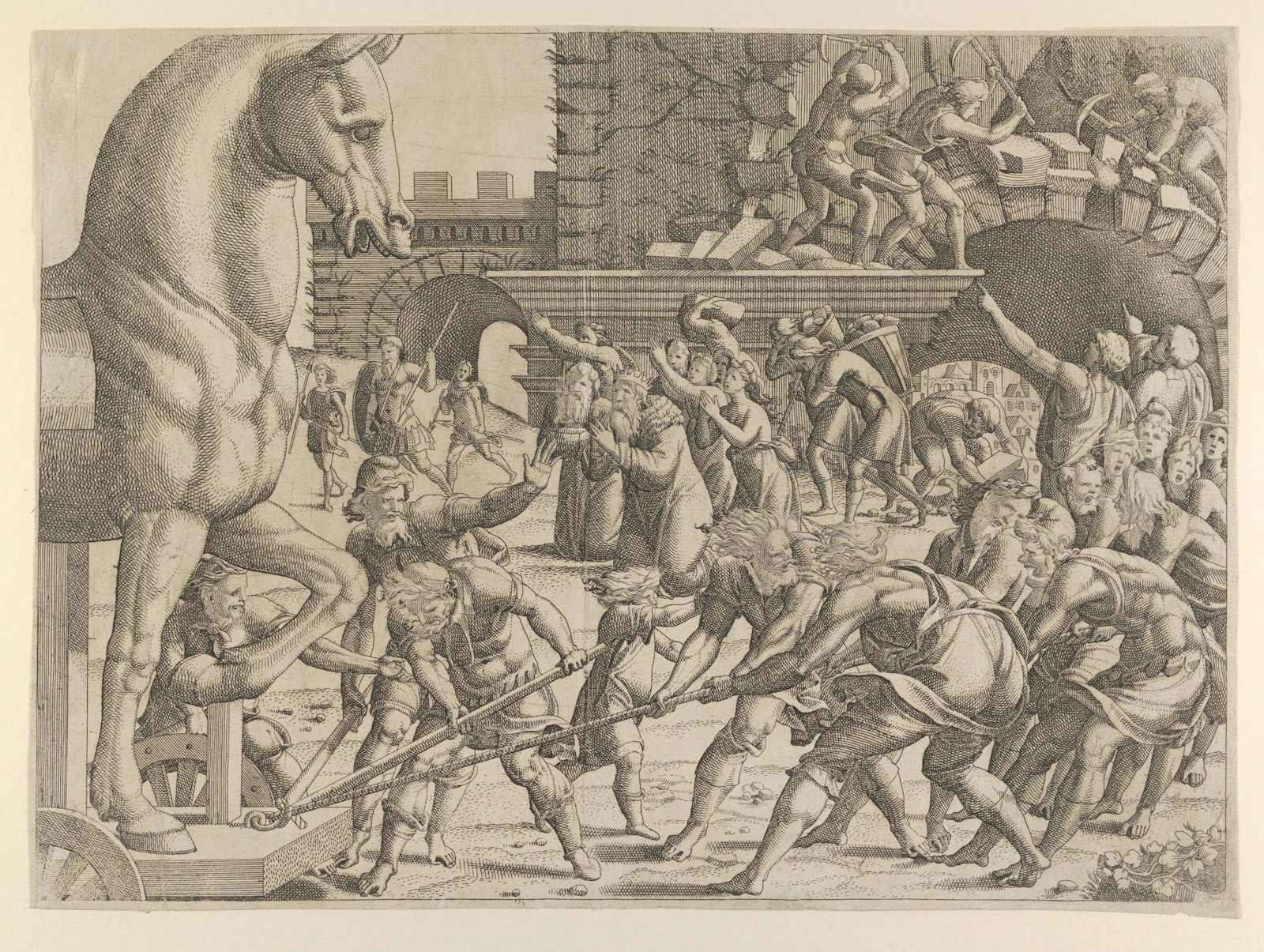
The Trojans Bring the Wooden Horse into Their City past Jean Mignon (1535–1555).
After the Trojans finished jubilant their "victory" and went to bed, the men in the equus caballus opened a trap door, climbed out, and opened the urban center gates to the rest of the army, which had in the meantime sailed dorsum to Troy. At last, the Greeks had found a manner to get past Troy's impregnable walls—by trickery. In one case inside, they proceeded to sack and pillage the city that they had spent a decade fighting.41
#The Return Journey: Odysseus in the Odyssey
Though Odysseus played an extremely important office in the Trojan State of war, he is fifty-fifty more famous for his later adventures. These are the bailiwick of the second great Homeric epic, the Odyssey .
Ismarus and the Cicones
Shortly afterwards setting sheet from Troy, Odysseus and his twelve ships put in at the town of Ismarus in Thrace. Though Odysseus' men hands raided the city, they made the mistake of getting boozer after. While their guard was downward, they were attacked by the neighboring Cicones, who killed seventy-two of Odysseus' men and forced the residuum to retreat.42
The Lotus-Eaters
Odysseus' ships were and so diddled off course past storms, which brought them to the land of the Lotus-eaters. After tasting the lotus fruit, Odysseus' men fell into a beatific land and no longer cared nigh returning home. But their captain dragged them to the ships, strapped them down, and sailed abroad.43
The Cyclops
Odysseus' next stop was the isle of the Cyclopes, a race of behemothic one-eyed shepherds. Ane Cyclops, Polyphemus, managed to trap Odysseus and a few of his men in his cave and proceeded to swallow them. In fact, he would have eaten them all had Odysseus not devised a program to escape.
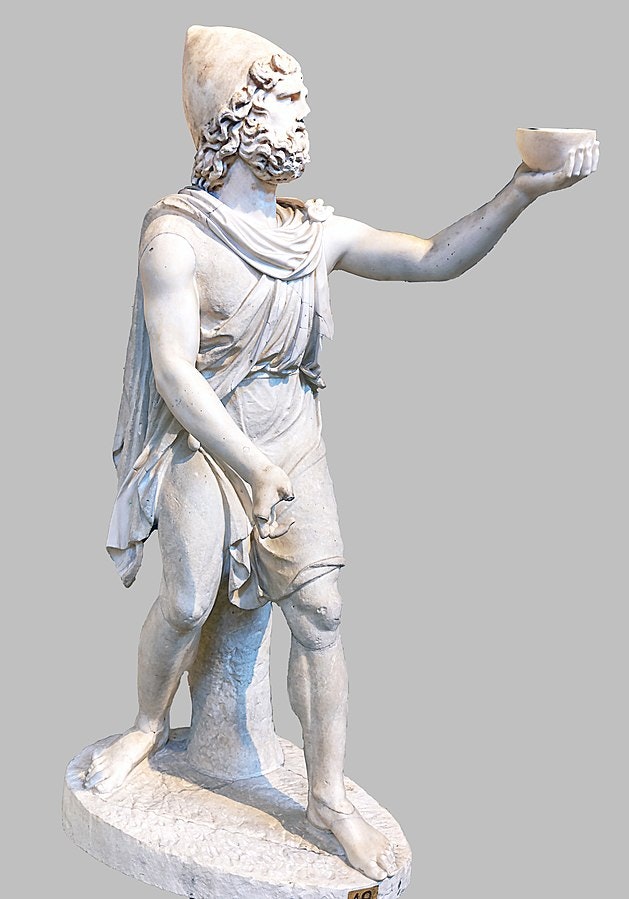
Statue of Odysseus offering wine to the Cyclops. 2d century BCE Roman copy of Hellenistic original. Vatican Museums, Vatican.
First, Odysseus got Polyphemus drunk with some wine he happened to accept on manus. When the Cyclops fell into a deep, drunken sleep, Odysseus and his remaining men blinded him with a sharpened stake. Polyphemus woke upward screaming, but, because Odysseus had told him earlier that his proper name was "Nobody," his cries did him little good: as he called for help, Polyphemus could only say that "Nobody" was hurting him, then his neighbors assumed he was sick or simply having a bad dream.
The next day, when the blinded Polyphemus opened his cave to pasture his sheep, Odysseus and his men were able to sneak away. But once they were safely in their transport, Odysseus could non resist the urge to taunt the Cyclops. Equally he and his men were sailing away, he cried out:
Cyclops, if any one of mortal men shall ask thee about the shameful blinding of thine eye, say that Odysseus, the sacker of cities, blinded it, even the son of Laertes, whose home is in Ithaca.44
Polyphemus heard Odysseus and bandage a boulder at him, nearly sinking the ship. He and then begged his father Poseidon to avenge him. This was how Odysseus incurred the hatred of Poseidon, who prevented him from reaching home for ten years.45
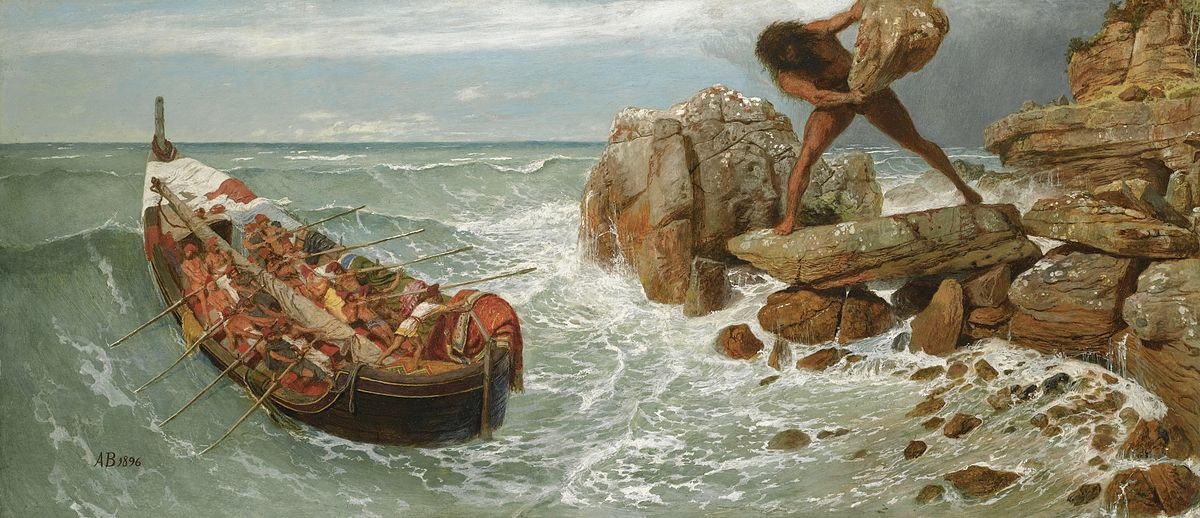
Odysseus and Polyphemus by Arnold Böcklin (1896). Museum of Fine Arts, Boston.
Aeolus and the Winds
Odysseus then sailed to the island of Aeolus, the primary of the winds. Aeolus took a liking to Odysseus and gave him a purse containing all of the winds except the West Wind. With the weather now in his favor, Odysseus would have a quick and easy journey home.
And indeed, Odysseus made information technology about of the manner to Ithaca without incident. Just while he was sleeping, his men opened the bag of winds, thinking Odysseus was hiding a treasure within. The released winds quickly blew Odysseus all the mode back to Aeolus. Realizing that Odysseus must accept angered some god, Aeolus refused to help the hero a second time.46
More Misfortunes: The Laestrygonians and Circe
Things only got worse for Odysseus from here. First he came to the land of the cannibalistic Laestrygonians, who attacked his ships while they were in harbor and ate his men. Of Odysseus' twelve ships, eleven were destroyed—forth with all the men inside. Only Odysseus' ship was able to go away.47
Odysseus, at present with only one ship, next came to the isle of the sorceress Circe, a daughter of the sunday god Helios. Odysseus sent out a pocket-size party of men to explore, merely just ane of them, Odysseus' blood brother-in-law Eurylochus, returned. Eurylochus revealed that, every bit he hid, the other men drank a potion that Circe gave them and were immediately transformed into pigs.
With the help of Hermes, Odysseus was able to runway down Circe and force her to change his men back. Impressed, Circe entertained Odysseus and his men for a long time, giving them a welcome break from their wanderings. Odysseus himself became Circe's lover.48
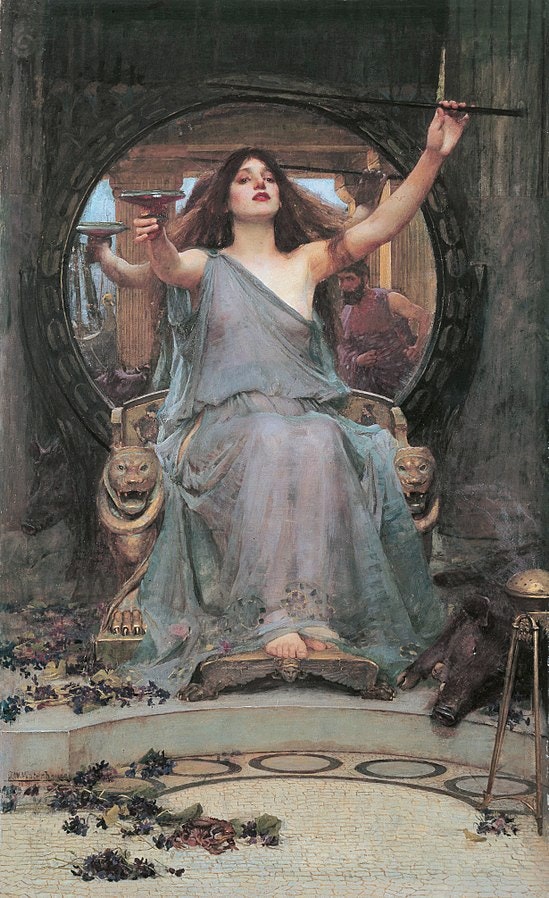
Circe Offering the Cup to Odysseus past John William Waterhouse (1891). Gallery Oldham, Greater Manchester, Britain.
The Underworld
Eventually, Odysseus decided that it was time to leave Circe and make another endeavour to go home. When he asked Circe for directions, she told him that the but person who could help him was the prophet Tiresias. But since Tiresias was expressionless, the just way to speak to him would exist to visit him in the Underworld.
Circe revealed how to get to the Underworld and what sacrifices Odysseus needed to make to gratify the infernal gods. She too told him that when the shades of the dead approached him, he could speak with them by letting them drink from the sacrificial claret.
Odysseus did as Circe instructed and successfully entered the Underworld. When Tiresias appeared, he gave Odysseus clear instructions to avoid harming the cattle of Helios when he and his men put in on the island of Thrinacia. He also warned Odysseus that when he did reach Ithaca, he would find his palace overrun by suitors trying to marry his wife Penelope and claim his kingdom.
Tiresias then revealed that Odysseus had offended Poseidon by blinding his son Polyphemus; thus, after returning to Ithaca, he would need to keep another journey to appease the powerful god:
practice thou go forth, taking a shapely oar, until thou comest to men that know naught of the sea and swallow not of nutrient mingled with common salt, aye, and they know naught of ships with purple cheeks, or of shapely oars that are every bit wings unto ships. And I volition tell thee a sign right manifest, which will non escape thee. When another wayfarer, on meeting thee, shall say that thou hast a winnowing-fan on thy stout shoulder, and so do thou fix in the earth thy shapely oar and make goodly offerings to lord Poseidon—a ram, and a bull, and a boar that mates with sows—and depart for thy home and offer sacred hecatombs to the immortal gods who agree broad heaven, to each one in due order.49
Tiresias ended past prophesying Odysseus' death: "And expiry shall come to thee thyself far from the sea, a death and so gentle, that shall lay thee low when thou art overcome with sleek sometime age, and thy people shall dwell in prosperity around thee."l
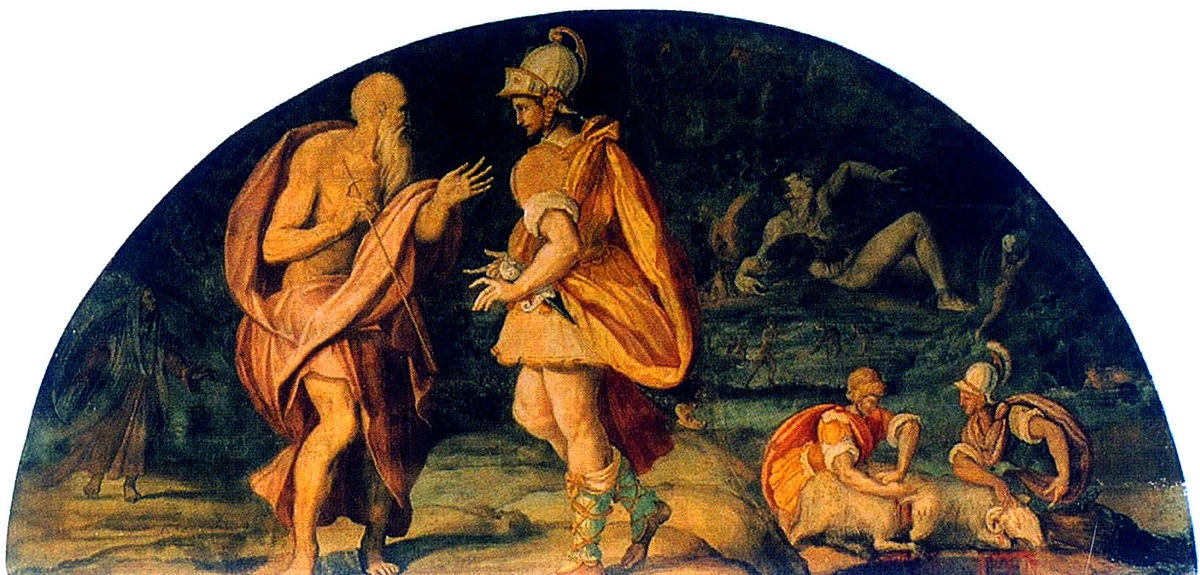
Odysseus Questions the Seer Tiresias by Alessandro Allori (1580). Palazzo Salviati, Florence, Italian republic.
After learning what he needed from Tiresias, Odysseus spoke to the shades of people he had known while they were alive, including Achilles, Agamemnon, and even his ain mother, Anticlea, who had died waiting for her son to come home from Troy. He besides saw many famous dead heroes (Theseus, Heracles) and villains suffering eternal punishment (Sisyphus, Tantalus).51
Sea Monsters and Sacred Cows
Odysseus and his men so returned to Circe'due south island, where they buried i of their companions, Elpenor, who had died while they were preparing to canvas for the Underworld.
When they gear up off again, Odysseus and his men offset sailed by the Sirens, monsters who lured sailors to their death with their beautiful song. Odysseus stopped his men'south ears with wax so that they would non hear the fatal music. Just Odysseus was determined to listen; thus, he had himself lashed to the mast and so he could hear the song without diving to his death.52
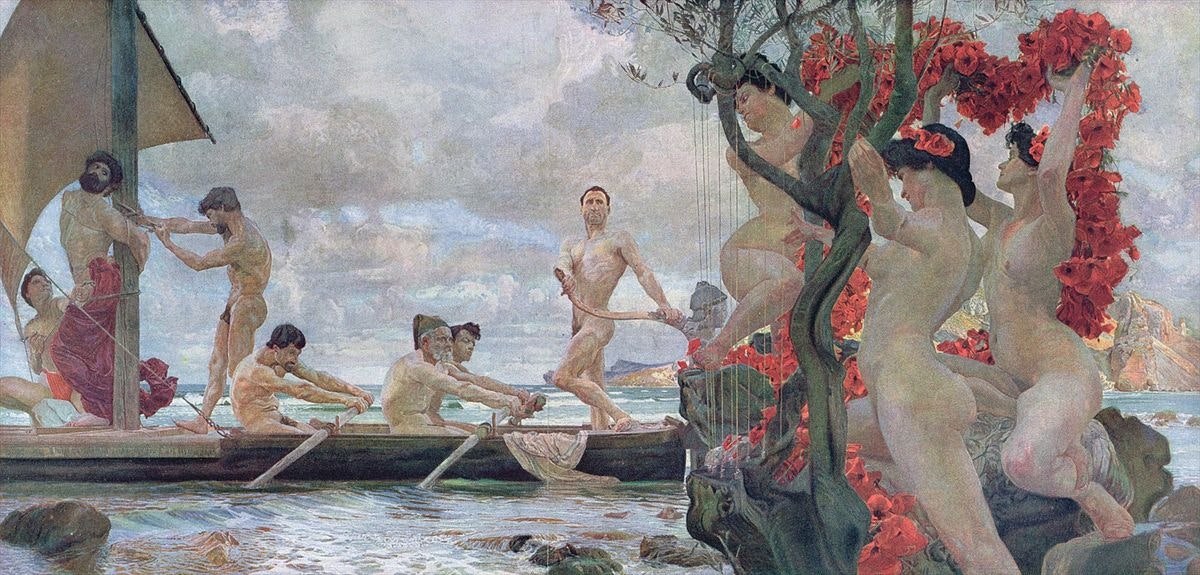
Ulysses and the Sirens past Otto Greiner (19th century). Museum der Bildenden Künste, Leipzig, Germany.
Odysseus then passed betwixt the many-headed monster Scylla and the whirlpool Charybdis, two creatures who inhabited reverse sides of a narrow strait. Post-obit Circe'southward advice, Odysseus steered close to Scylla, knowing that while she would devour half dozen of his men (1 for each of her mouths), Charybdis would eat the whole send and all of his men with it.53
After passing these monsters, Odysseus reached the isle of Thrinacia, which was sacred to the sun god Helios. Though Odysseus warned his men not to harm the cattle of Helios (equally Tiresias had instructed), they ignored him and hunted down the sacred animals. Helios reported this crime to Zeus, who acquired a storm to wreck Odysseus' ship. Odysseus—who solitary had not touched Helios' cattle—was the sole survivor.54
Ogygia and Calypso
Later losing his terminal transport and all of his crew, Odysseus was washed ashore on the island of Ogygia. There he was found by Calypso, the daughter of the Titan Atlas. Calypso made Odysseus her lover and forced him to remain with her for vii years.
Eventually, the gods remembered Odysseus, and Zeus sent Hermes to social club Calypso to release the hero.55 Calypso immune Odysseus to build a raft, but not before offering to make him immortal if he stayed with her. Odysseus gently declined this offer:
I know full well of myself that wise Penelope is meaner to await upon than m in comeliness and in stature, for she is a mortal, while yard art immortal and ageless. But notwithstanding I wish and long twenty-four hours by day to accomplish my dwelling, and to run into the 24-hour interval of my render.56
The Phaecians
Odysseus built a raft and fix sail from Ogygia. Just when Poseidon saw him, he sent up a great tempest that wrecked the raft. It was only with the help of the sea goddess Leucothoe that Odysseus was able to avert drowning. Clinging to a piece of timber, he floated on the bounding main for days until he done ashore on Scheria, the island of the Phaecians.57
It was on Scheria that Odysseus' luck finally took a plow for the better. He was discovered on the beach by the princess Nausicaa, who told him to come to the palace. There, Odysseus was welcomed past the kindly king Alcinous and his wife Arete. Odysseus somewhen agreed to tell his story, later which the Phaecians gave him many beautiful gifts, put him on a send, and took him to Ithaca. After twenty years, Odysseus had finally come home.58
The Suitors
Dorsum in Ithaca, Odysseus discovered that, as Tiresias had warned, many suitors had come to his palace to try to marry his wife Penelope. To prevent them from recognizing and killing him, Athena disguised Odysseus equally an sometime beggar.59
Odysseus first establish his way to the house of Eumaeus, a swineherd and a loyal former servant. In that location he met his son, Telemachus, at present a fully grown man. Overcome, Odysseus revealed his identity to Telemachus and Eumaeus and recruited them to help him defeat the suitors.60
Odysseus and so went to the palace, nevertheless bearded as a beggar. The suitors, living off of the estate of the absent Odysseus, had made his palace their home. For a few days Odysseus played the role of the beggar, letting himself be mistreated by the suitors.61 He was recognized merely by his dog Argus, who died immediately after existence reunited with his principal, and past his old nurse Euryclea, who recognized him past the scar on his thigh.62
Odysseus did not reveal his identity to Penelope, but he did speak to her privately one dark at the palace. During their interview, Penelope told Odysseus that she had been fending off the obnoxious suitors for years, simply that she had decided to ally whichever one of them could string Odysseus' former bow and shoot an arrow through twelve axe rings.63
The side by side day, Penelope announced the test of Odysseus' bow. When none of the suitors were able to even string it (much less shoot an pointer through the rings), the "ragamuffin" Odysseus asked to try. Of course, he hands accomplished the chore. He then revealed his identity to the shocked suitors and—with the help of his son Telemachus, the swineherd Eumaeus, and the cowherd Philoetius—proceeded to slaughter them all.64
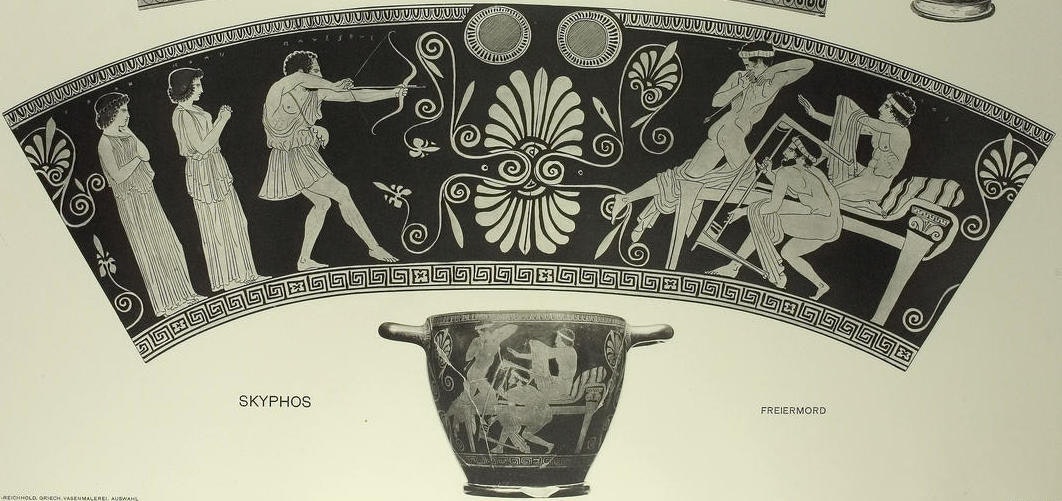
Illustration of Attic ruby effigy skyphos from Tarquinia depicting Odysseus killing the suitors of Penelope (ca. 440 BCE).
Later the massacre, Odysseus resolved to scour his abode clean. He had the handmaids who had slept with the rowdy suitors clean upwards their bodies; in one case they had finished their task, he hanged them.65
Reunion with Penelope
Odysseus then revealed himself to Penelope. But Penelope, who had not seen her husband in twenty years, was hesitant to take him at his word.
Penelope decided to test Odysseus to make sure it was really him. She ordered the servants to bring out his bed so that he could sleep, but Odysseus immediately told her that this was impossible, for he had built the bed out of a living olive tree. Since only the existent Odysseus could have known this fact, Penelope realized that her husband had finally come home.66
Laertes and the People of Ithaca
The side by side day, Odysseus went out to the country, where his aged father, Laertes, had his estate. Immediately after father and son were reunited, however, Odysseus learned that the people of Ithaca, wanting revenge for the deaths of the suitors, had taken up artillery against him.
Odysseus and Laertes grabbed their weapons and prepared to fight the angry mob. But but so Athena appeared to persuade both sides to make peace with one another.67
#Other Adventures and Death
Following his render to Ithaca, Odysseus was forced to set out on another journeying: he yet needed to appease Poseidon, who had been angry with him ever since he had blinded Polyphemus.
Odysseus sailed to northern Hellenic republic and traveled deep inland with an oar on his shoulder, as Tiresias had instructed him to do. When he met somebody who mistook the oar for a winnowing fan, he planted it in the ground and sacrificed to Poseidon.
But Odysseus did non immediately go home. Instead, he stayed in the kingdom of the Thesprotians and even married the Thesprotian queen, Callidice. He and then helped the Thesprotians fight a war against their neighbors. After Callidice died, Odysseus made their son, Polpoetes, rex of Thesprotia and sailed back to Ithaca.
In the meantime, Telegonus, Odysseus' son by Circe, had set canvas in search of his father. When he arrived in Ithaca, he started raiding the countryside; in response, Odysseus went out to face the violent stranger. Unfortunately, the begetter and son did not recognize each other, and Telegonus killed Odysseus with a spear whose tip had been poisoned with the affront of a stingray.
When Telegonus realized that he had killed his begetter, he was heartbroken. He buried and mourned Odysseus, so brought Penelope and Telemachus to his mother's island of Aeaea. There, Telemachus married Circe, while Telegonus himself married Penelope.68
#Other Versions
There were also other, lesser-known versions of the last adventures of Odysseus.
In some accounts, Penelope did not wait faithfully for Odysseus to return, as she did in the Odyssey. Instead, she took a god or one of the suitors (or even all of the suitors, in some versions) as her lover. When Odysseus came home and discovered this, he either banished Penelope,69 killed her,lxx or left Ithaca to keep his wanderings.71
In other versions, Odysseus was exiled from Ithaca for killing the suitors and ended upward sailing to Aetolia, the mainland region simply opposite Ithaca. There, he married the daughter of a sure Thoas, settled down, and eventually died of old age.72
#Interpretations
Odysseus is and e'er has been an clashing figure. In the Odyssey—the primeval surviving source to tell his myth—he is depicted relatively sympathetically. But even Homer'southward Odysseus is more of an "antihero" than the straightforwardly heroic Achilles: he relies less on his physical prowess than on his intellect, and he does not hesitate to employ trickery and deceit.
Compared to Homer, other sources were much more disquisitional of Odysseus. The poet Pindar, for example, claimed that Homer had exaggerated how much Odysseus actually suffered,73 while the philosopher Plato dismissed the hero equally an unprincipled liar and trickster.74
Some Greek literature, especially tragedy, tended to highlight the darker sides of Odysseus' character. In the Sack of Troy, an early Greek epic, Odysseus cruelly throws Hector'southward immature son Astyanax off the walls of Troy as the Greeks burn the city;75 in Sophocles' Philoctetes, he displays a cynical and self-serving personal philosophy;76 and in Euripides' Hecuba, he is coldly calculating in conveying out the sacrifice of Hecuba's daughter Polyxena.77
Roman literature was fifty-fifty more unkind to Odysseus. While describing the fall of Troy in Book 2 of the Aeneid, Virgil depicts Odysseus as a cruel and impious villain. Seneca paints a similar portrait of Odysseus in his Trojan Women.78 Ovid, characteristically, is less consistent: in Volume 13 of the Metamorphoses, Odysseus comes across as an unscrupulous sophist, while Heroides ane, written from the perspective of Penelope, presents him in a more than sympathetic light.
#Worship
Odysseus was the subject of hero cult at several ancient Mediterranean sites, most of them associated with his mythology. These included Aetolia and Epirus (the area of his later travels),79 Libya (where the Lotus-eaters were believed to have lived),lxxx and Tarentum in southern Italy.81 Dedications to Odysseus have likewise been discovered on his home isle of Ithaca. Finally, the Spartans had a shrine dedicated to Odysseus, where they claimed to business firm the Palladium that he had in one case stolen from Troy.82
#Pop Civilisation
As ane of the most famous Greek heroes, Odysseus has had an indelible presence in modern pop culture.
In literature, he has appeared in or inspired numerous poems, epics, novels, and graphic novels, including Alfred Lord Tennyson's "Ulysses" (1842), James Joyce's Ulysses (1918–1920), Nikos Kazantzakis' The Odyssey: A Modern Sequel (1938), Eyvind Johnson's Return to Ithaca (1946), Eric Shanower's Age of Statuary graphic novel series (1998–), Margaret Atwood'due south The Penelopiad (2005), David Gemmell's Troy trilogy (2005–2007), Glyn Iliffe's Adventures of Odysseus series (2008–2017), and Margaret Miller'due south The Song of Achilles (2011) and Circe (2018).
The myth of Odysseus has also been adapted many times for film and television, with various actors taking on the role. In film, these include Kirk Douglas in the Italian Ulysses (1955), John Drew Barrymore in The Trojan Horse (1961), and Sean Bean in Troy (2004). In telly, Odysseus has been portrayed by John D'Aquino in Xena: Warrior Princess (1995–2001), Armand Assante in The Odyssey (1997), and Joseph Mawle in Troy: Fall of a City (2018). The 2000 film O Brother, Where Art M, starring George Clooney as Ulysses Everett McGill, is loosely based on the Odyssey.
Odysseus is also featured in other media, such every bit the song "Tales of Brave Ulysses" (1967) by the British band Cream and the video game Total War Saga: Troy (2020).
True to the ancient tradition, nigh mod adaptations of Odysseus nowadays a highly ambivalent character, one who is devoted to his family and habitation but also driven by a thirst for gamble—or, in some cases, violence and greed. Hence the dilemma of Tennyson'due south famous Ulysses, who finally reaches Ithaca afterwards two decades of war and wandering only to detect that he "cannot rest from travel."
Farther Reading
#Principal Sources
Odysseus is an important grapheme in many surviving works of ancient literature, equally well equally in many that no longer exist (for instance, the epics of the Trojan Bicycle and the Telegony). The Odyssey, which fortunately has survived in full, is by far the most important source for his myth.
Greek
-
Homer: Odysseus is the main graphic symbol of the Odyssey, but he is besides cardinal to the Iliad (eighth century BCE).
-
Hesiod: There are references to Odysseus in the Theogony and the fragmentary Catalogue of Women (seventh or sixth century BCE).
-
Pindar: Odysseus is represented in a less sympathetic light in Nemean Odes 7 and 8 (early fifth century BCE).
-
Sophocles: Odysseus is a grapheme in two surviving tragedies by Sophocles: the Ajax (probably 440s BCE) and the Philoctetes (409 BCE).
-
Gorgias: Odysseus is shown in a negative light in the spoken language Palamedes (mid-fifth century BCE), a defence force speech communication or "Apology" written in response to the charge of treason brought by Odysseus confronting Palamedes.
-
Euripides: Odysseus is a character in the Hecuba (420s BCE) and plays a behind-the-scenes office in the Trojan Women (415 BCE) and Iphigenia in Aulis (405 BCE).
-
Alcidamas: In the spoken communication Odysseus (fourth century BCE), Odysseus accuses Palamedes of treachery.
-
Plato: In the Hippias Minor (fourth century BCE), Socrates compares Achilles to Odysseus and concludes that Achilles is the superior hero.
-
Tryphiodorus: Odysseus plays an of import role in the Autumn of Troy, a poem of the fourth or third century BCE.
-
Lycophron: Odysseus appears in the third-century BCE poem Alexandra, in which the Trojan Cassandra predicts the fall of her city and the subsequently fortunes of the Greeks who fought in the war.
-
Diodorus of Sicily: The Library of History, a work of universal history covering events from the creation of the creation to Diodorus' ain fourth dimension (mid-get-go century BCE), contains references to the myths of Odysseus.
-
Strabo: Odysseus and his myths are mentioned a few times in the Geography, a belatedly first-century BCE geographical treatise and an important source for many local Greek myths, institutions, and religious practices from artifact.
-
Dionysius of Halicarnassus: Odysseus is mentioned in the Roman Antiquities (late first century BCE or early on first century CE) as one of the founders of Rome.
-
Pausanias: Odysseus and several myths about him are mentioned in the Description of Hellenic republic, a second-century CE travelogue and, like Strabo'southward Geography, an important source for local myths and customs.
-
Apollodorus: The myths of Odysseus (and their variants) are summarized in the Library and Prototype, representing a single mythological handbook from the first century BCE or the kickoff few centuries CE.
-
Quintus of Smyrna: Odysseus features in the fourth-century CE epic Posthomerica, which describes the stop of the Trojan War.
Roman
-
Cicero: Ulysses is mentioned in some of Cicero'due south works, specially the mid-first-century BCE dialogue On the Limits of Good and Evil, in which the hero is praised for his cunning heed.
-
Horace: Ulysses features in some of Horace'southward poetry, perhaps most notably Book 2 of the Satires (ca. 30 BCE), which includes a continuation of Ulysses' discussion with Tiresias in the Underworld.
-
Virgil: Odysseus appears in Virgil'south Aeneid (nineteen BCE) nether the name Ulixes or Ulysses (his Roman name), where he is depicted as a barbarous villain responsible for the fall of Troy and the massacre of the Trojan people.
-
Propertius: Some of Propertius' poems mention Ulysses, including the twelfth verse form in Volume 3 of the Elegies (late first century BCE), which briefly summarizes Ulysses' wanderings after the Trojan War.
-
Ovid: The first of the Heroides (late get-go century BCE) takes the form of a letter of the alphabet from Penelope to the long-lost Ulysses. Ulysses also features in other poems by Ovid, such as the Metamorphoses (ca. 8 CE).
-
Seneca: Ulysses is a character in the Trojan Women (offset century BCE or first century CE), which describes the firsthand aftermath of the Trojan War.
-
Statius: Ulysses appears in Statius' Achilleid, an ballsy verse form started effectually 94 CE and left unfinished at the time of the author's expiry around 96 CE. The first book tells of how Achilles was hidden by his mother on Skyros until Ulysses came to get him.
-
Hyginus: The Fabulae, a Latin mythological handbook (first or second century CE), includes sections on the myths of Ulysses.
-
Dictys of Crete: The Periodical of the Trojan War (fourth century CE) claims to be a Latin translation of a journal kept past a certain Dictys who fought with the Greeks during the Trojan War.
-
Dares of Phrygia: The History of the Autumn of Troy (sixth century CE) claims to be a firsthand account of the autumn of Troy, originally composed by a Trojan priest.
-
Fulgentius: The Mythologies, a Latin mythological handbook (5th or sixth century CE), contains sections on the myths of Ulysses.
#Secondary Sources
-
Brown, Andrew. "Odysseus." In The Oxford Classical Dictionary, 4th ed., edited by Simon Hornblower, Antony Spawforth, and Esther Eidinow, 1032–33. Oxford: Oxford University Press, 2012.
-
Finley, Moses I. The World of Odysseus. New York: New York Review, 1952.
-
Gantz, Timothy. Early Greek Myth: A Guide to Literary and Creative Sources. 2 vols. Baltimore, MD: Johns Hopkins University Press, 1996.
-
Graves, Robert. The Greek Myths. London: Penguin, 1955.
-
Hall, Edith. The Return of Ulysses: A Cultural History of Homer's "Odyssey." London: I. B. Tauris, 2008.
-
Kerényi, Károly. The Heroes of the Greeks. London: Thames and Hudson, 1974.
-
Nagy, Gregory. The Best of The Achaeans: Concepts of the Hero in Archaic Greek Poesy. Baltimore, Medico: Johns Hopkins University Press, 1979.
-
Rose, H. J. A Handbook of Greek Mythology. London: Methuen, 1929.
-
Smith, William. "Odysseus." In A Lexicon of Greek and Roman Biography and Mythology. London: Spottiswoode and Company, 1873. Perseus Digital Library. Accessed September four, 2021. https://world wide web.perseus.tufts.edu/hopper/text?doc=Perseus%3Atext%3A1999.04.0104%3Aalphabetic+letter%3DO%3Aentry+group%3D2%3Aentry%3Dodysseus-bio-ane.
-
Stanford, William B. The Ulysses Theme: A Study in the Adaptability of a Traditional Hero. Oxford: Blackwell, 1954.
-
Stanford, William B., and John V. Luce. The Quest for Ulysses. New York: Praeger, 1974.
-
Touchefeu-Meynier, Odette. "Odysseus." In Lexicon Iconographicum Mythologiae Classicae, Vol. vi, 943–seventy. Zurich: Artemis, 1992.
Source: https://mythopedia.com/topics/odysseus
0 Response to "Who Played the Sirens in Brother Where Art Thou"
Post a Comment